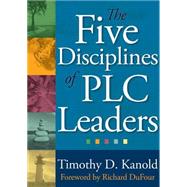- ISBN: 9781935543428 | 1935543423
- Cover: Paperback
- Copyright: 6/30/2011
Just as it takes discipline to successfully run a marathon or to master a musical instrument, effective leadership in a professional learning community (PLC) requires practice, patience, and skill. PLC leaders at all levels face multiple paradoxes: they must lead by serving, engage stakeholders through strategic disengagement, allow autonomy within defined boundaries, and inspire others through their own humility. In The Five Disciplines of PLC Leaders, Timothy D. Kanold offers a focused framework that will help educators maintain balance and consistent vision as they strengthen the paradoxical skills of PLC leadership. This framework provides the following five key practices, or disciplines: 1. The discipline of vision and values strengthens understanding of personal vision and the ability to forge a coherent, compelling vision with other stakeholders. It ensures that a PLC¿s mission, vision, values, and goals are in alignment. 2. The discipline of accountability and celebration forms the bridge between the development of a vision and the implementation of a plan. Through practice in this discipline, a PLC leader is able to stay focused on goals and accountability while acknowledging and celebrating achievements along the way. 3. The discipline of service and sharing addresses one of the core components of an effective PLC: leadership requires personal accountability to the shared vision and the integrity of other community members. This discipline strengthens communication, social connections, and relationships between all stakeholders. 4. The discipline of reflection and balance helps a PLC leader manage time and energy. It develops a leader¿s ability to discern when to take charge in high-energy activities and when to withdraw, fostering engagement and ownership in others. 5. The discipline of inspiration and influence builds a deep awareness of the future impact of today¿s actions. This discipline is a vital part of the process of turning a group into a team that has a lasting influence on a PLC and its students.






